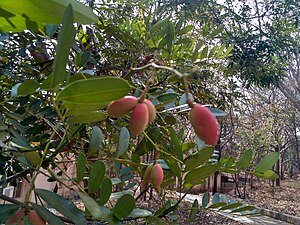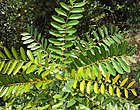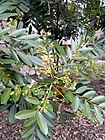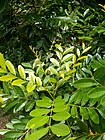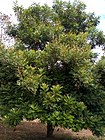Note: This is a project under development. The articles on this wiki are just being initiated and broadly incomplete. You can Help creating new pages.
Simarouba glauca
Simarouba glauca is an evergreen, small or medium-sized tree with a narrow crown. It usually grows up to 15 metres tall. but specimens up to 27 metres are recorded. The straight, cylindrical bole can be free of branches for up to 9 metres, 30cm or more in diameter. The plant is often used for medicinal purposes.
Contents
- 1 Uses
- 2 Parts Used
- 3 Chemical Composition
- 4 Common names
- 5 Properties
- 6 Habit
- 7 Identification
- 8 List of Ayurvedic medicine in which the herb is used
- 9 Where to get the saplings
- 10 Mode of Propagation
- 11 Cultivation Details
- 12 Commonly seen growing in areas
- 13 Photo Gallery
- 14 References
- 15 External Links
Uses
Malaria, Fever, Dysentery, Cancer, Leukaemia, Diarrhoea, Haemorrhages, Intestinal parasites, Colitis.
Parts Used
Chemical Composition
Common names
| Language | Common name |
|---|---|
| Kannada | |
| Hindi | |
| Malayalam | |
| Tamil | |
| Telugu | |
| Marathi | |
| Gujarathi | |
| Punjabi | |
| Kashmiri | |
| Sanskrit | |
| English | Areca nut |
Properties
Reference: Dravya - Substance, Rasa - Taste, Guna - Qualities, Veerya - Potency, Vipaka - Post-digesion effect, Karma - Pharmacological activity, Prabhava - Therepeutics.
Dravya
Rasa
Guna
Veerya
Vipaka
Karma
Prabhava
Habit
Identification
Leaf
| Kind | Shape | Feature |
|---|---|---|
Flower
| Type | Size | Color and composition | Stamen | More information |
|---|---|---|---|---|
| Flowering season is December to April |
Fruit
| Type | Size | Mass | Appearance | Seeds | More information |
|---|---|---|---|---|---|
| Fruiting season is December to April |
Other features
List of Ayurvedic medicine in which the herb is used
Where to get the saplings
Mode of Propagation
Cultivation Details
A plant of the moist, lowland tropics, where it is found at elevations up to 800 metres. It grows best in areas where the mean annual temperature ranges between 22 - 29°c, but can tolerate a range of 18 - 34°c. It prefers a mean annual rainfall in the range 2,000 - 3,000mm, but tolerates 1,200 - 4,000mm, growing in areas with a distinct dry season and where there is no dry season.[3]
Commonly seen growing in areas
Dry forest or thickets, Dry open rocky hillsides.
Photo Gallery
References
External Links
- []
- []
- []
- Pages using duplicate arguments in template calls
- Pages that are stubs
- Ayurvedic Herbs known to be helpful to treat Malaria
- Ayurvedic Herbs known to be helpful to treat Fever
- Ayurvedic Herbs known to be helpful to treat Dysentery
- Ayurvedic Herbs known to be helpful to treat Cancer
- Ayurvedic Herbs known to be helpful to treat Leukaemia
- Ayurvedic Herbs known to be helpful to treat Diarrhoea
- Ayurvedic Herbs known to be helpful to treat Haemorrhages
- Ayurvedic Herbs known to be helpful to treat Intestinal parasites
- Ayurvedic Herbs known to be helpful to treat Colitis
- Herbs with Fruit used in medicine
- Herbs with Seed used in medicine
- Herbs with common name in English
- Habit - Evergreen Tree
- Index of Plants which can be propagated by Seed
- Herbs that are commonly seen in the region of Dry forest or thickets
- Herbs that are commonly seen in the region of Dry open rocky hillsides
- Ayurvedic Medicine
- Pages without herbs images
